Balconies can be a great way to add extra living space to your home, especially if you live in an urban area with limited outdoor space. However, choosing the right flooring material for your balcony can be a challenge. You want a material that is durable, easy to maintain, and looks great. Here are some of the top materials to consider when selecting balcony flooring.
Porcelain Tiles
Porcelain tiles are an excellent option for balcony flooring due to their durability, resistance to water and stains, and ease of maintenance. They come in a range of colors, patterns, and sizes, making it easy to create a unique look for your balcony that complements your home's style.
One of the biggest advantages of porcelain tiles is their durability. Porcelain is a dense, hard material that is resistant to scratches, chipping, and cracking. This makes it an ideal choice for high-traffic areas such as balconies. Additionally, porcelain tiles are resistant to water, making them a great choice for areas that receive a lot of rain or snow.
Another benefit of porcelain tiles is their resistance to stains. Unlike other materials such as natural stone, porcelain tiles are non-porous, which means that they won't absorb liquids that can cause discoloration or staining. This makes porcelain tiles a great option for areas that are exposed to spills or stains, such as outdoor dining areas.
Porcelain tiles are also incredibly easy to maintain. They can be cleaned with a mild detergent and water, and there's no need for special cleaning products or treatments. Additionally, porcelain tiles won't fade over time, so you can be confident that your balcony will maintain its beautiful appearance for years to come.
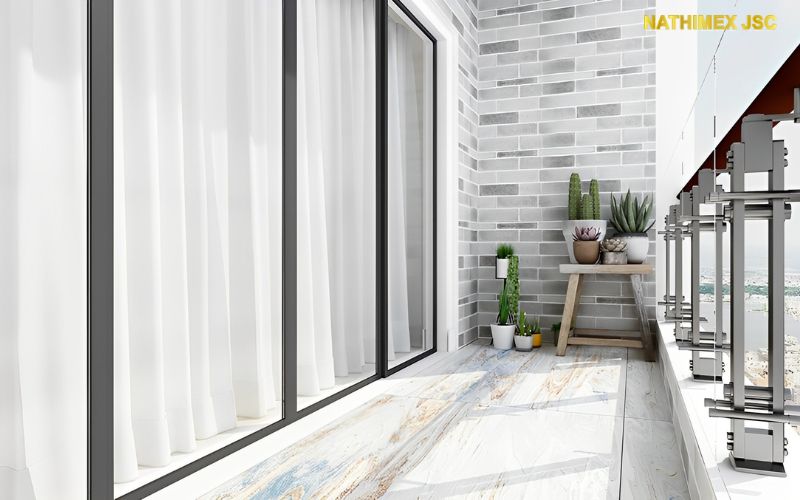
When selecting porcelain tiles for your balcony, there are a few factors to consider. First, you'll want to choose tiles that are rated for outdoor use. Outdoor-rated tiles are designed to withstand exposure to the elements, including rain, snow, and sunlight.
You'll also want to choose tiles that have a slip-resistant surface, especially if your balcony is located on an upper level. A slip-resistant surface will help to prevent accidents and injuries caused by slipping on wet or slick tiles.
In terms of style, porcelain tiles come in a range of colors and patterns, from classic neutrals to bold geometric designs. You can choose a pattern that complements your home's style or creates a unique look for your balcony.
Porcelain tiles are an excellent option for balcony flooring due to their durability, resistance to stains and water, and ease of maintenance. With a range of colors, patterns, and sizes available, it's easy to create a beautiful and functional outdoor space that you'll enjoy for years to come. Just make sure to select outdoor-rated tiles that are slip-resistant for optimal safety and longevity.
Composite Decking
Composite decking is a popular option for balcony flooring due to its durability, eco-friendliness, and low-maintenance requirements. It's made from a combination of wood fibers and plastic, creating a material that is resistant to moisture, insects, and rot.
One of the biggest advantages of composite decking is its durability. Unlike wood, which can rot, warp, or splinter over time, composite decking is designed to withstand the elements without deteriorating. It's also resistant to fading, stains, and scratches, making it an ideal option for high-traffic outdoor areas.
Composite decking is also an eco-friendly choice for balcony flooring. Many brands use recycled materials in their products, reducing the need for virgin materials and minimizing waste. Additionally, composite decking doesn't require the use of harmful chemicals such as wood preservatives or stains, making it a safer option for your family and the environment.
Another benefit of composite decking is its low-maintenance requirements. Unlike wood, which requires periodic staining or sealing, composite decking can be cleaned with a mild detergent and water. It doesn't need to be sanded, refinished, or painted, which can save you time and money in the long run.
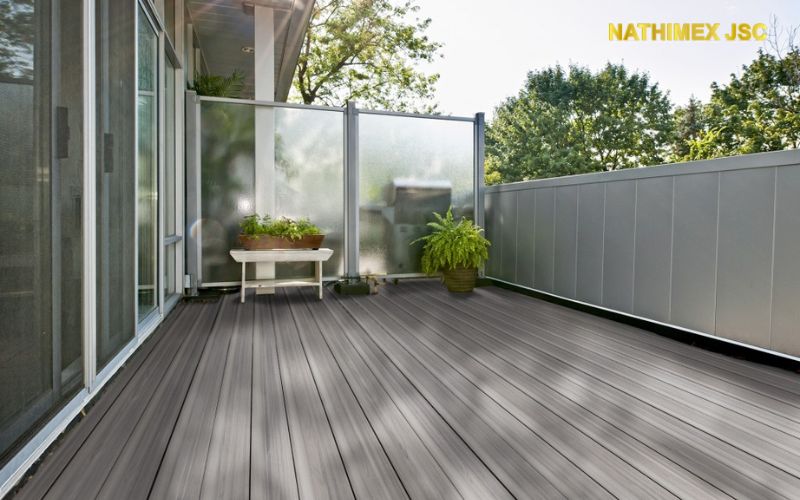
When selecting composite decking for your balcony, there are a few factors to consider. First, you'll want to choose a product that is designed for outdoor use. Some composite decking products are designed for indoor use only and may not be suitable for outdoor environments.
You'll also want to consider the color and texture of the decking. Composite decking comes in a range of colors and textures, from natural wood grains to bold colors and patterns. You can choose a product that complements your home's style or creates a unique look for your balcony.
Finally, you'll want to make sure that the decking is slip-resistant, especially if your balcony is located on an upper level. A slip-resistant surface will help to prevent accidents and injuries caused by slipping on wet or slick decking.
Composite decking is a durable, eco-friendly, and low-maintenance option for balcony flooring. With a range of colors and textures available, it's easy to create a beautiful and functional outdoor space that you'll enjoy for years to come. Just make sure to select a product that is designed for outdoor use and has a slip-resistant surface for optimal safety and longevity.
Natural Stone
Natural stone is a timeless and elegant option for balcony flooring. It adds a touch of luxury and sophistication to any outdoor space, and comes in a variety of colors and patterns to suit your personal style.
One of the biggest advantages of natural stone is its durability. Stone is a naturally hard and dense material that can withstand heavy foot traffic, extreme temperatures, and exposure to the elements. When properly sealed, natural stone is resistant to water, stains, and scratches, making it an ideal option for balconies.
Another benefit of natural stone is its natural beauty. Each stone has its own unique color and pattern, adding a one-of-a-kind element to your balcony. From the classic elegance of marble to the rustic charm of slate, natural stone can create a beautiful and inviting space.
Natural stone is also a sustainable option for balcony flooring. It's a natural material that can be sourced locally, reducing the need for transportation and minimizing its carbon footprint. Additionally, stone can be recycled and repurposed, further reducing waste and environmental impact.
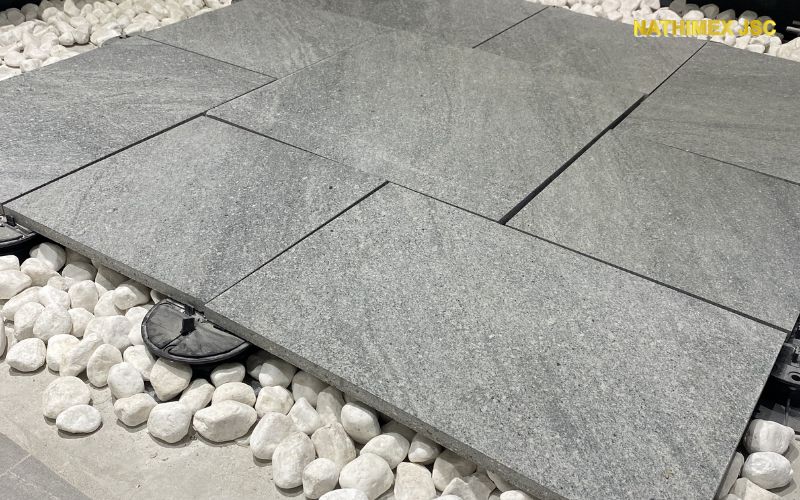
When selecting natural stone for your balcony, there are a few factors to consider. First, you'll want to choose a stone that is appropriate for outdoor use. Some types of stone are more porous than others and may require additional sealing to prevent water damage.
You'll also want to consider the color and pattern of the stone. Natural stone comes in a variety of colors and patterns, from earthy tones to vibrant hues. You can choose a stone that complements your home's style or creates a unique look for your balcony.
Finally, you'll want to ensure that the stone is slip-resistant, especially if your balcony is located on an upper level. A slip-resistant surface will help to prevent accidents and injuries caused by slipping on wet or slick surfaces.
Natural stone is a durable, beautiful, and sustainable option for balcony flooring. With its unique patterns and colors, it can add a touch of elegance to any outdoor space. Just make sure to select a stone that is appropriate for outdoor use and has a slip-resistant surface for optimal safety and longevity.
Concrete
Concrete is a popular and practical option for balcony flooring. It's durable, low-maintenance, and can be customized with various finishes and textures to suit your personal style.
One of the biggest advantages of concrete is its durability. It's a strong and sturdy material that can withstand heavy foot traffic, extreme temperatures, and exposure to the elements. When properly sealed, concrete is also resistant to water, stains, and scratches, making it a practical option for balconies.
Concrete is also a versatile option for balcony flooring. It can be customized with various finishes and textures to create a unique and personalized look. Some popular finishes include stamped concrete, which can resemble natural stone or other materials, and colored concrete, which can be tinted to match your home's color scheme.
Another benefit of concrete is its low-maintenance requirements. It doesn't require periodic sealing or refinishing like natural stone, and can be easily cleaned with a mild detergent and water. This can save you time and money in the long run, making it a practical choice for busy homeowners.
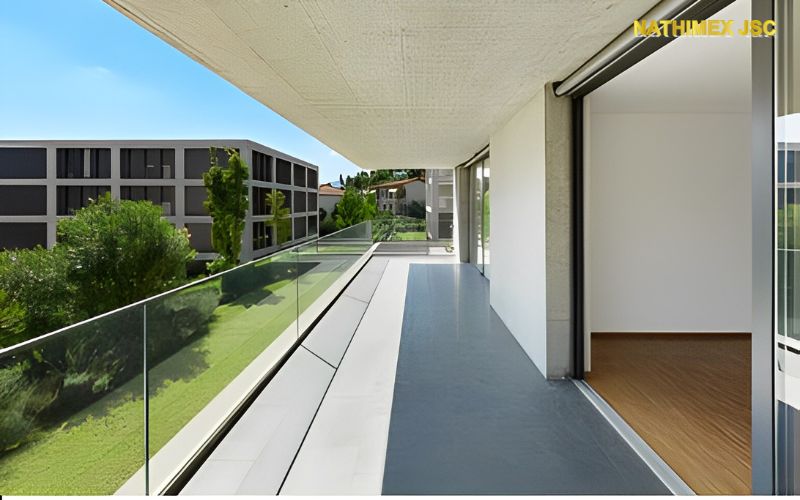
When selecting concrete for your balcony, there are a few factors to consider. First, you'll want to ensure that the concrete is properly installed to prevent cracking or settling over time. You'll also want to consider the finish and texture of the concrete, as well as any additional features such as patterns or designs.
Another consideration is the slip-resistance of the concrete. A smooth concrete surface can be slippery when wet, so you may want to consider a textured finish or an anti-slip coating to improve safety.
Concrete is a practical, durable, and versatile option for balcony flooring. With its low-maintenance requirements and customizable finishes, it can create a functional and stylish outdoor space that you'll enjoy for years to come. Just make sure to select a high-quality installation and consider slip-resistance to ensure optimal safety and longevity.
Wood Decking
Wood decking is a classic and stylish option for balcony flooring. It adds warmth and natural beauty to outdoor spaces, and can be customized with various finishes and stains to suit your personal style.
One of the biggest advantages of wood decking is its aesthetic appeal. Wood is a warm and natural material that can create a cozy and inviting atmosphere on your balcony. It's available in a variety of colors and patterns, from light and natural to dark and rich, so you can choose a look that complements your home's style.
Another benefit of wood decking is its versatility. It can be customized with various finishes and stains to create a unique and personalized look. Some popular finishes include natural oil finishes that bring out the natural beauty of the wood, as well as solid stains that provide color and protection from the elements.
Wood decking is also a sustainable option for balcony flooring. It's a renewable resource that can be sourced locally, reducing the need for transportation and minimizing its carbon footprint. Additionally, wood decking can be recycled and repurposed, further reducing waste and environmental impact.
When selecting wood decking for your balcony, there are a few factors to consider. First, you'll want to choose a high-quality, durable wood species such as cedar, redwood, or tropical hardwoods like ipe or mahogany. These woods are naturally resistant to decay, rot, and insect damage, making them ideal for outdoor use. You'll also want to ensure that the wood decking is properly installed and maintained. This includes using stainless steel or coated screws to prevent rust and corrosion, as well as periodic sealing and cleaning to maintain the wood's natural beauty and prevent water damage.
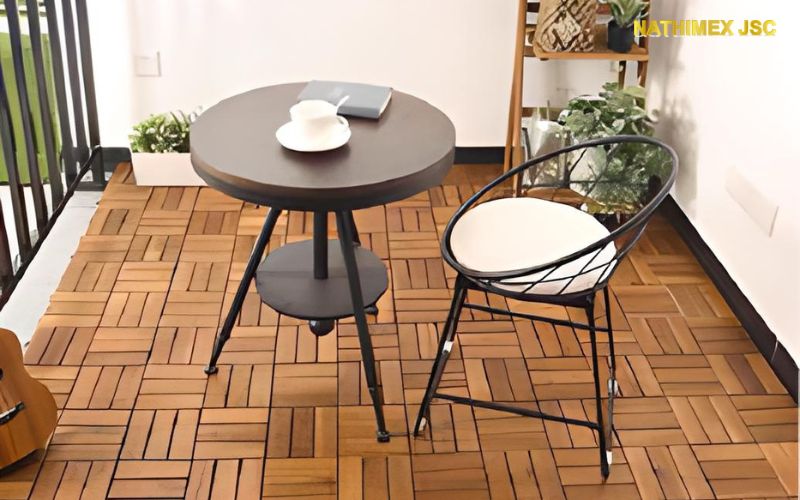
Finally, you'll want to consider the slip-resistance of the wood decking. A smooth wood surface can be slippery when wet, so you may want to consider a textured finish or an anti-slip coating to improve safety. Wood decking is a classic, versatile, and sustainable option for balcony flooring. With its natural beauty and customizable finishes, it can create a warm and inviting outdoor space that you'll enjoy for years to come. Just make sure to select a high-quality wood species, properly install and maintain the decking, and consider slip-resistance to ensure optimal safety and longevity.
In conclusion, choosing the right material for your balcony flooring depends on your personal style, budget, and maintenance preferences. Porcelain tiles, composite decking, natural stone, concrete, and wood decking are all great options to consider. Consider the climate in your area, how much maintenance you're willing to do, and the overall style you're trying to achieve when making your decision. With the right flooring material, you can create a beautiful and functional outdoor space that you'll enjoy for years to come.
